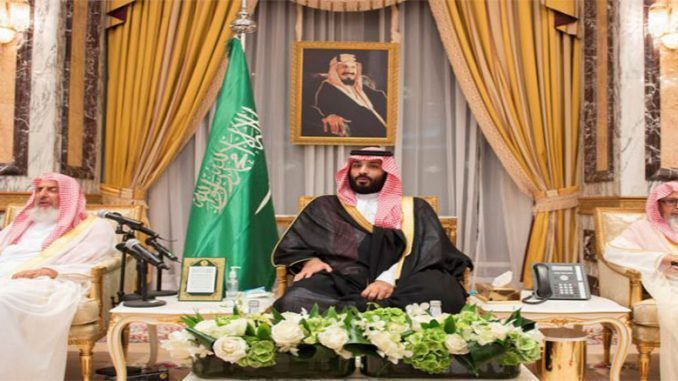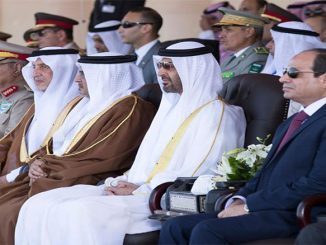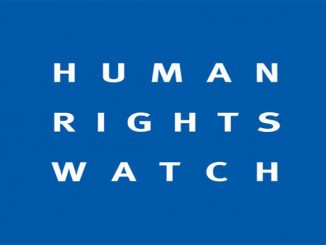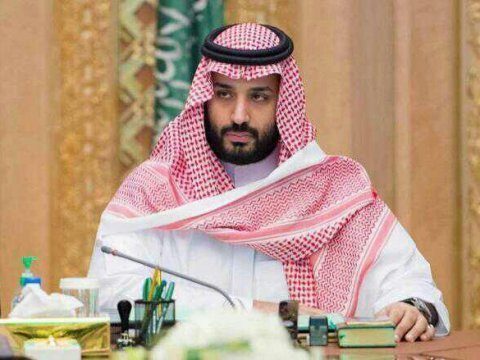
Saudi Arabia has recently executed 37 people after they were sentenced to death based on ambiguous charges. Unfortunately, the real murderers who plotted and killed journalist Jamal Khashoggi at the Saudi consulate in Istanbul last October, were not amongst them.
The victims were lumped together and charged with several ambiguous charges such as terrorism, conspiracy to undermine security, spying, spreading Shia doctrine and murder. The crucified man was accused of murdering a woman and conspiring to murder another one.
“The execution of 37 people convicted on (terrorism) charges marks an alarming escalation in Saudi Arabia’s use of the death penalty, said Amnesty International today. Among those put to death was a young man who was convicted of a crime that took place while he was under the age of 18,” read a report issued by Amnesty International. At least 33 of those executed belonged to the kingdom’s Shiite minority, and human rights organizations expressed doubts about the fairness of their trials.
These mass executions are a chilling demonstration of the Saudi Arabian authorities callous disregard for human life. It is also yet another gruesome indication of how the death penalty is being used as a political tool to crush dissent from within the country’s Shi’a minority, according to Lynn Maalouf Middle East Research Director at Amnesty International.
Among those executed is Abdulkareem al-Hawaj – a young Shi’a man who was arrested at the age of 16 and convicted of offences related to his involvement in anti-government protests. Under international law, the use of the death penalty against people who were under the age of 18 at the time of the crime is strictly prohibited.
The executions were announced in a statement on the state-run news agency, which said the men had been put to death for “their adoption of extremist, terrorist ideology and forming terrorist cells to corrupt and disturb security, spread chaos and cause sectarian discord.” Some men had been involved in bomb attacks on security headquarters that had killed officers, the agency said.
The statement also accused them of “cooperating with hostile parties in a way that damaged the high interests of the homeland.” It listed the 37 men by name but provided little information about what specific crimes had been committed by whom or when.
The majority of those executed were convicted after sham trials that violated international fair trial standards which relied on confessions extracted through torture, according to Amnesty.
The victims include 11 men who were convicted of spying for Iran and sentenced to death after a grossly unfair trial. At least 14 others executed were convicted of violent offences related to their participation in anti-government demonstrations in Saudi Arabia’s Shi’a majority Eastern Province between 2011 and 2012. The 14 men were subjected to prolonged pre-trial detention and told the court that they were tortured or otherwise ill-treated during their interrogation in order to have ‘confessions’ extracted from them.
“The use of the death penalty is always appalling but it is even more shocking when it is applied after unfair trials or against people who were under 18 at the time of the crime, in flagrant violation of international law,” said Lynn Maalouf.
“Instead of stepping up executions at an alarming rate in the name of countering terrorism, Saudi Arabia must halt this bloody execution spree immediately and establish an official moratorium on executions as a first step towards abolishing the death penalty completely,” said Amnesty’s Lynn Maalouf.
The victims were convicted based on confessions that they later withdrew in court because, they said, they had been tortured, according to Adam Coogle, who monitors Saudi Arabia for Human Rights Watch. “As a matter of principle, none of these people had lawyers during investigation, so all of these cases are unfair,” he said.
At least three of those executed were from the kingdom’s Sunni majority. It was not clear what their crimes were. Saudi Arabia also carried out three other unrelated executions on Tuesday, bringing the number of such punishments this year to 106, according to a count by Human Rights Watch. The kingdom executed 148 people in 2018.
This act of mass punishment is a travesty of justice for many reasons. First, a political system that subjects the judiciary to its absolute power cannot be trusted to deliver real justice.
Secret trials undermine the credibility of the Saudi justice system. Furthermore, confessions under torture, a common practice in such high-profile executions, amount to nothing but injustice, yielding unreliable statements from prisoners, and is in stark violation of human rights.
But of course, the Saudi regime does not give great attention to such details and, without the regime being held accountable, no one can challenge the abysmal state of Saudi prisons and what goes on behind closed doors.
When we realise that lawyer Waleed Abual-Khair and woman’s rights activist Lujain al-Hathloul, among hundreds of prisoners of conscience are put on trial in terrorism courts although they are peaceful activists, we can conclude that in the eyes of the regime blowing up people is on par with writing an article, tweeting a message, or representing a political prisoner of conscience if one is a lawyer.
In such a situation, even Amnesty International and Human Rights Watch, which both reported on the executions and questioned the state terrorism narrative, face the allegation that they are sympathizers with terrorists.
In the unlikely situation that a Western government expresses doubt, concern or mild reservations about the large number of executions, the Saudis will revert to the justification that this is exactly what the West expects, namely an iron fist to end terrorism.
The Saudi regime thinks of itself as the vanguard against terrorism, as a participant in the “War on Terror” and the international coalition against the Islamic State. Mass executions of terrorists should be welcomed rather than questioned, it believes. Vague terrorism charges have truly become an umbrella under which an opaque judiciary and a hawkish regime silences dissent.
Saudi public prosecution sought death penalty for Salman al-Awdah
In September 2018, public prosecutors in Saudi Arabia sought the death penalty against prominent Muslim scholar Salman al-Awdah, according to local media, activists and his family members.
Awdah, who has been described by UN experts as a “reformist,” was imprisoned more than a year ago, shortly after Crown Prince Mohammed bin Salman launched a crackdown on dissent and imposed a land, sea and air blockade on the kingdom’s Gulf neighbour, Qatar. Awdah, who has 14 million followers on Twitter, posted a tweet on September 9, saying: “May God harmonize between their hearts (Arab Gulf rulers) for the good of their people” – an apparent call for reconciliation between the Gulf countries.
Awdah’s son, Abdullah, wrote on Twitter that the charges against his father included critical tweets and establishing an organization which worked to defend the honor of the Prophet Muhammad. “Today, at a court hearing for my father Sheikh Salman al-Awdah, the prosecution requested the death penalty against him, and submitted 37 charges, one of which was establishing the al-Nusra organization in Kuwait to defend the Prophet (PBUH), and being a member of the European Council for Fatwa and Research and the International Union of Muslim scholars, with other charges related to his tweets on Twitter.” Amnesty International’s Saudi Arabia campaigner Dana Ahmed called the reports “a disturbing trend in the Kingdom [that] sends a horrifying message that peaceful dissent and expression may be met with the death penalty”.
Saudi crackdown on dissent
The ruling Al Saud family has long regarded Islamist groups as the biggest internal threat to its rule. In the 1990s, the Sahwa (Awakening) movement demanded political reforms that posed a challenge to the ruling family. Al-Awdah, a Sahwa leader, was imprisoned from 1994-99 for agitating for political change. In 2011, al-Awdah called for elections and separation of powers, demands considered dangerous provocations in the kingdom.
Saudi Arabia, an absolute monarchy where public protests and political parties are banned, has witnessed a massive crackdown on dissent, with dozens of religious leaders, intellectuals and women’s rights activists arrested in the past few years.
Among those arrested were prominent Islamic preachers Awad al-Qarni, Farhan al-Malki, Mostafa Hassan and Safar al-Hawali.
Al-Hawali, 68, was detained after he published a 3,000-page book attacking bin Salman and the ruling family over their ties to Israel, calling it a “betrayal”. Three of Al-Hawali sons – Abdul Rahman, Abdullah and Ibrahim – were also detained. Rights groups say Abdul Rahman and Abdullah were reportedly taken into custody while attending a family wedding. While Hawali and his son Ibrahim were arrested the following morning. Hawali became known almost three decades ago as the leader of the Sahwa movement, which advocated for democracy in Saudi Arabia. He was previously detained for opposing the ruling family.
While 15 murderers who plotted and killed journalist Jamal Khashoggi at the Saudi consulate in Istanbul last October are still unpunished, Saudi Arabia, under Crown Prince Mohammed Bin Salman, has launched a crackdown against activists, religious figures and opponents; and accelerated executions based on politicized and unfair trials.
But how far will this go?



